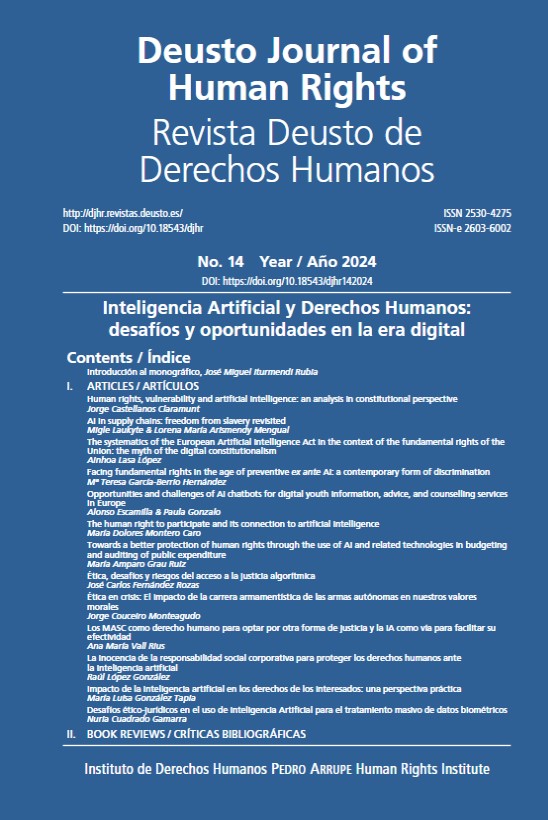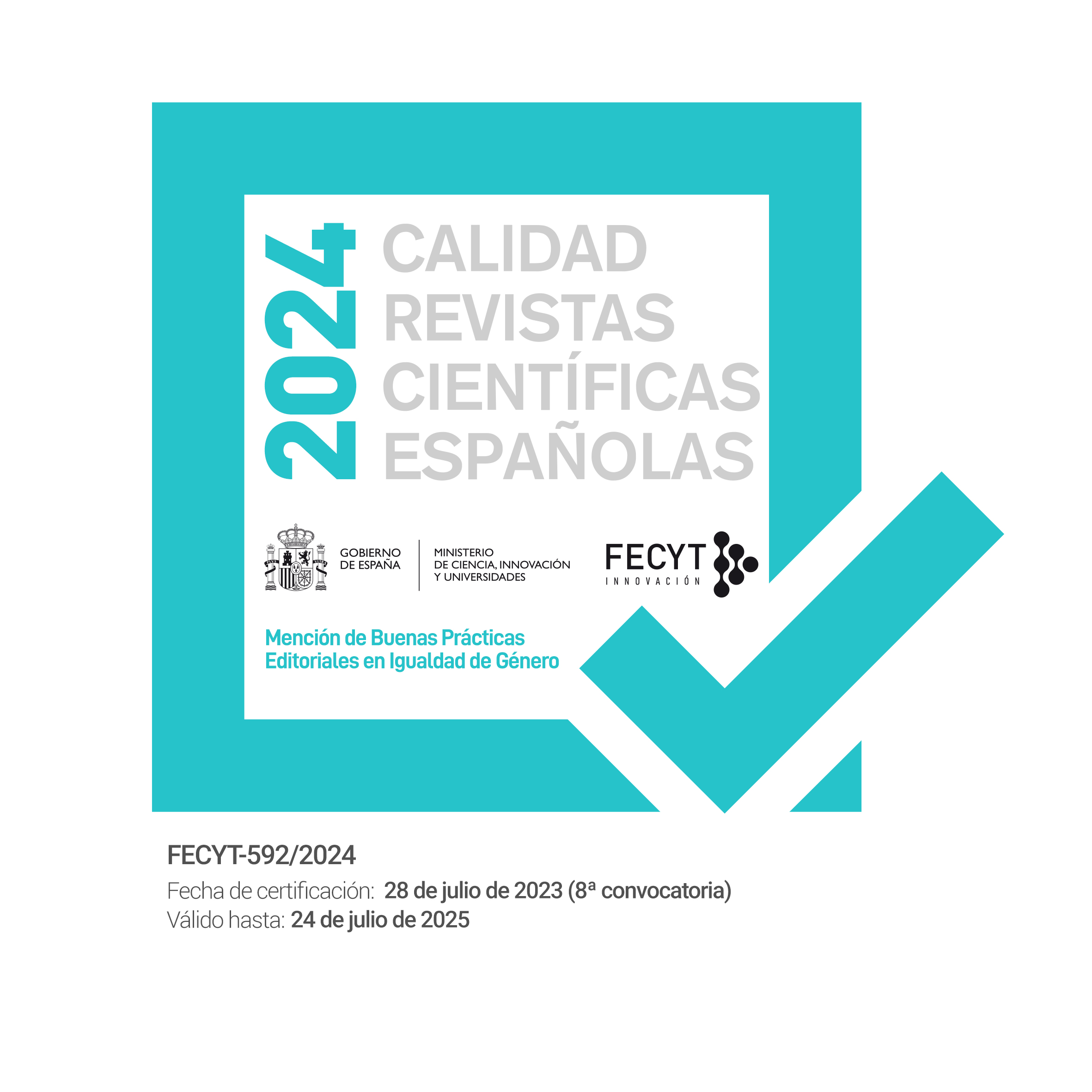Towards a better protection of human rights through the use of AI and related technologies in budgeting and auditing of public expenditure
Abstract
The full potential of many human rights cannot be reached due to the economic costs in their development. The use of artificial intelligence and related technologies in budgetary and audit processes could help in a better allocation of scarce public resources and deliver savings due to better targeting in programming and execution, avoiding irregularities and corruption. When public and corporate organizations automate processes, monitoring should ensure their compliance with regulation or voluntary commitments affecting environmental, social, and governance criteria. Many funds are granted to support digitalization processes if safeguards related to human rights are respected. The provision of goods and services like health and education is often subject to additional technological requirements. In both cases, an efficient supervision is crucial for fairness, in terms of accessibility and the effective protection of human rights.
Received: 08 September 2024
Accepted: 10 December 2024
Downloads
References
Berryhill, Jamie, Kevin K. Heang, Rob Clogher & Keegan McBride. 2019. «Hello, world: Artificial Intelligence and its use in the public sector.» OECD Working Papers on Public Governance 36. https://doi.org/10.1787/726fd39d-en.
Collovà, Claudio, Velina Lilyanova & Nele Lüker. 2024. «Digital public services in the National Recovery and Resilience Plans. Mid-term multilevel governance appraisal.» Briefing European Parliamentary Research Service PE 762.287.
European Parliament. 2024. «Briefing for the FEMM delegation to UN CSW 68 (18-22 March 2024).» Briefing Directorate-General for Internal Policies PE 760.544.
European Parliament. 2021. Proceedings of the workshop on «Use of big data and AI in fighting corruption and misuse of public funds - good practice, ways forward and how to integrate new technology into contemporary control framework.» Directorate General for Internal Policies of the Union. PE 691.722.
Fedeli, Mark. 2024. «Power through fiscal year-end budgeting with AI, workflow automation.» Accessed May 22, 2024. https://www.federaltimes.com/opinions/2024/04/22/power-through-fiscal-year-end-budgeting-with-ai-workflow-automation/#:~:text=More%20federal%20agencies%20are%20harnessing,traceability%20of%20data%20across%20programs.
Fernández-Cortez, Vanessa, David Valle-Cruz & José Ramón Gil-García. 2020. «Can Artificial Intelligence help optimize the public budgeting process? Lessons about smartness and public value from the Mexican Federal Government.» IEEE Xplore 978-1-7281-5882-2/20.
Grau, Mª Amparo. 2023. «La utilización de la inteligencia artificial en la función de control.» Revista Española de Control Externo 74-75: 72-91.
Grau, Mª Amparo. 2022a. «Fiscal transformations due to AI and robotization: where do recent changes in tax administrations, procedures and legal systems lead us?». Northwestern Journal of Technology and Intellectual Property 19: 325-363. Accessed: May 24, 2024. https://scholarlycommons.law.northwestern.edu/njtip/vol19/iss4/1.
Grau, Mª Amparo. 2022b «The Alignment of Taxation and Sustainability: Might the Digital Controls of Non-Financial Information Become a Universal Panacea?» Review of European & Comparative Law 3: 61.
Grau, Mª Amparo. 2020 «Los Derechos Humanos en el siglo XXI: ¿Cómo financiar su coste para salvaguardar su efiacia?» In Los Derechos Humanos en el siglo XXI, Tomo III: Los Derechos Humanos desde la perspectiva política y social, edited by José Antonio Pinto and Ángel Sánchez de la Torre, 175-180. Madrid: Edisofer.
Johnston, Liz. 2023a. «What State and Local Governments Should Look for in a Cloud Budgeting Software Solution.» January 19. Accessed: May 24, 2024. https://www.resourcex.net/blog/what-state-and-local-governments-should-look-for-in-a-cloud-budgeting-software-solution.
Johnston, Liz. 2023b. «GFOA Budgeting Best Practices for State and Local Governments.» February 16. Accessed: May 24, 2024. https://www.resourcex.net/blog/gfoa-budgeting-best-practices-for-state-and-local-governments.
Johnston, Liz. 2023c. Step-by-Step Guide to the Public Sector Budgeting Process. April 27. Accessed: May 24, 2024. https://www.resourcex.net/blog/step-by-step-guide-to-the-public-sector-budgeting-process.
Johnston, Liz 2022b. «What Is Government Budgeting Software? 3 Basics to Know.» September 8. Accessed: May 24, 2024. https://www.resourcex.net/blog/government-budgeting-software-3-basics-to-know.
Lilyanova, Velina. 2024. «Investment in artificial intelligence in the National Recovery and Resilience Plans.» Briefing European Parliamentary Research Service. PE 762.288.
Maciejewski, Mariusz. 2024. «Law and ICT, Policy Department for Citizens’ Rights and Constitutional Affairs.» Directorate-General for Internal Policies. PE 762.738.
Mahmutaj, Klentiana. Forthcoming. «Artificial Intelligence, Regulation, and the Right to Development.» Thematic study by the Expert Mechanism on the Right to Development. Accessed: May 24, 2024. https://www.ohchr.org/en/documents/ongoing-studies/artificial-intelligence-regulation-and-right-development-thematic-study.
Malan, Jack and Marta Dimauro. 2022. «Single Audit Approach - Root Causes of the Weaknesses in the Work of the Member States’ Managing and Audit Authorities.» European Parliament STUDY. PE 732.267.
Martín López, Jorge. 2023. Inteligencia artificial y comprobación tributaria: transparencia y no discriminación, Pamplona: Aranzadi.
Navarra, Cecilia, Aleksandra Heflich and Meenaakshi Fernandes. 2024. «Improving EU action to end poverty in developing countries. Cost of non- Europe report.» European Parliament STUDY. PE 747.425.
Preut, Anna, Jan-Philip Kopka and Uwe Clausen. 2021. «Digital twins for the circular economy.» Sustainability 13 (18): 10467. https://doi.org/10.3390/su131810467.
Rampton, James et al. 2024. «The future of digitalisation in budgetary control.» Directorate-General for Internal Policies. PE 759.623.
Resource X. 2023. «Artificial Intelligence for budgeting: maximizing resources with AI modeling.» November 14. Accessed: July 12, 2024. https://www.resourcex.net/blog/artificial-intelligence-for-budgeting-maximizing-resources-with-ai-modeling.
United Nations. 2022. Revolutionizing public financial management with cutting-edge AI-powered tools. Accessed: may 13, 2024. https://www.unescwa.org/AI-budgeting.
United Nations. 2023. «Financing for development gateway: Financing is about transforming lives not just economies.». Accessed: August 21, 2024. https://www.unescwa.org/sites/default/files/inline-files/23-00158-Financing-for-Development-Gateway-Web.pdf.
Valle-Cruz, David, Vanessa Fernández-Cortez and Ramón Gil-García. 2022. «From e-budgeting to smart budgeting: Exploring the potential of artificial intelligence in government decision-making for resource allocation.» Government Information Quarterly 39: 101644.
Deusto Journal of Human Rights / Revista Deusto de Derechos Humanos is an Open Access journal; which means that it is free for full and immediate access, reading, search, download, distribution, and reuse in any medium only for non-commercial purposes and in accordance with any applicable copyright legislation, without prior permission from the copyright holder (University of Deusto) or the author; provided the original work and publication source are properly cited (Issue number, year, pages and DOI if applicable) and any changes to the original are clearly indicated. Any other use of its content in any medium or format, now known or developed in the future, requires prior written permission of the copyright holder.



3.jpg)
3.jpg)
3.jpg)
.jpg)








